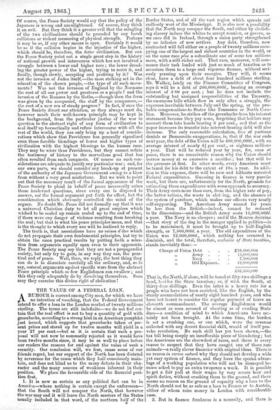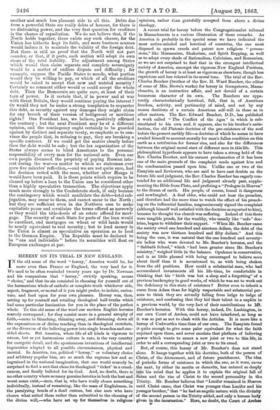THE - VALUE OF I FEDERAL LOAN. A_ RUMOUR is current
among City men, for which we have no intention of vouching, that the Federal Government intend to offer a loan in the London market of twenty millions sterling. The terms are still indefinite—we do not feel cer- tain that the real effort is not to buy a quantity of gold with greenbacks, according to a strong hint in an American pamphlet just issued, which suggests that greenbacks taken at pre- sent prices and stored up for twelve months will yield in a year 27 per cent.—but as it _is certain that such a pro- posal will not now be summarily rejected as it would have been twelve months since, it may be as well to place before our readers the reasons for and against the value of such a security. Our conclusion will, we fear, cause some of our friends regret, but our support of the North has been dictated by reverence for the cause which they half-consciously main- tam, and does not blind us to the many defects in their cha- racter and the many sources of weakness inherent in their position. We place the favourable side of the financial posi- tion first.
1. It is now as certain as any political fact can be in America—where nothing is certain except the unforeseen— that the South will not conquer the North, that however the war may end it will leave the North masters of the States usually included in that word, of the northern half of the • Border States, and of all the vast region which spreads out endlessly west of the Mississippi. It is also now a possibility that the North may conquer the South, and either by abolish- ing slavery induce the whites to accept reunion, or govern, as we once did in Ireland, through a union party strengthened by an infusion of new settlers. Any debt, therefore, now contracted will fall either on a people of twenty millions occu- pying one of the largest and richest countries in the world, or on the same race plus a subordinate one of some ten millions more, with a still richer soil. That race, moreover, will com- mence their task loaded with just so much of taxation as to accustom them to a large and vigorous finance, without seri- ously pressing upon their energies. They will, it seems clear, have a debt of about four hundred millions sterling. Mr. Walker' lately on the Finance Committee of Congress, says it will be a debt of 200,000,000/., bearing an average interest of 3-80 per cent ; but he does not include the outstanding but unsigned responsibilities of the Treasury, the enormous bills which flow in only after a struggle, the expenses inevitable between July and the spring, or the pro- bable compensations•to States like Tennessee or North Caro- lina. Moreover, he strikes off the greenbacks from his interest statement because they pay none, forgetting that holders may convert them into bonds bearing 6 per cent., and that as the paper increases its transfer into interest-bearing debt will also increase. The only reasonablb calculation, free of partizan denials or Democratic exaggerations, is, that if the war ends next year, the debt of the Union will be 400,000,0001., with an average interest of nearly 44- per cent., or eighteen millions a year. That will be reduced year by year, for, once at peace, there is no conceivable reason why the Union should borrow money at so excessive a sacrifice ; but that will be the pressure at first. In other words, every American must be taxed for his debt to the extent of 18s. a year. In addi- tion to this expense, there will be new and hitherto untested Federal expenditures. Guessing in finance is very puerile work, but there are, unfortunately for the North, grounds for estimating these expenditures with some approach to accuracy. Their Army costs more than ours, from the higher rate of pay,. the better rations, the waste in cloning, and the absence of the system of purchase, which makes our officers very nearly self-supporting. The American Army cannot for years be less than the British—indeed, cannot be reduced to its dimensions—and the British Army costs 15,000,000/. a year. The Navy is no cheaper; and if the Monroe doctrine —that story of the dog in the manger applied to politics--is to be maintained, it must be brought up to half-English strength, or 7,500,000/. a year. The old expenditure of the Union was 12,000,0001., which nothing has occurred to diminish, and the total, therefore, exclusive of State taxation, stands inevitably thus :— Charge of Union Debt . . . £18,000,000 Army . . . 15,000,000
31
11 Navy . . . 7,500,000 Old Expenses. . 12,000,000 452,500,000 That is' the North, if alone, will be taxed at fifty-two shillings a head, besides the State taxation; or, if with the South, at thirty-four shillings. Even the latter is a heavy rate for a people who have not been enriched, like the English, by the steady accumulations of nearly eight hundred years' and who have not learnt to consider the regular payment of taxes an eleventh commandment. The average Englishman would be almost as soon accused of cheating as of evading State dues—a condition of mind to which Americans have cer- tainly not been brought. At the same time, the burden is not a crushing one, or one which, were the revenue collected with any decent financial skill, would of itself pro- voke revolution. No such skill has yet been shown,—the tax bill being simply an insufferable piece of blundering ; but the Americans are the shrewdest of races, and there is every reason to suspect that they have caught one of those rare animals—a really clever financier with original ideas. There is no reason in rerum naturd why they should not develop a wide yet easy system of finance, and they have the special advan- tage of a working population who will not be dismayed be- cause asked to pay an extra twopence a week. It is possible to get a fair pull at their wages by very severe beer and spirit duties, without crushing them to the ground, and there seems no reason on the ground of capacity why a loan to the North should not be as safe as a loan to France or to Austria, either of whom raise money in London with considerable ease.
2. But in finance frankness is a necessity, and there is another and much less pleasant side to all this. Debts due from a powerful State are really debts of honour, for there is
no distrainin,g power, and the very first question for creditors
is the chance of repudiation. We do not believe that, if the North holds together, there exists any such chance, for the 'Union has hitherto kept its faith, and mere business acumen would induce it to maintain the validity of the foreign debt. But there is still no proof that the North will not part
asunder, or that, if it parts, each section will adopt its own share of the total liability. The adjustment among States which would then claim separate and complete sovereignty -would be a matter of endless dispute and difficulty ; for 'example, suppose the Pacific States to secede, what portion would they be willing to pay, or which of all the creditors would be asked to accept that new and untried security ? Certainly no remnant either would or could. accept the whole debt. Then the Democrats are quite sure, at least of their turn of power. Is it certain that, if in power and at war with Great Britain, they would continue paying the interest ? Or would they not be under a strong temptation to sequester this debt, as security against any damages they might claim for any breach of their version of belligerent or maritime rights ? One President has' we believe, positively affirmed the contrary ; but the next President may be of a different opinion, and the contingency ought certainly to be guarded against by distinct and separate treaty, so emphatic as to con- vince the people that, in refusing to pay, they are breaking a specific contract. If we could get the matter clearly before them the debt would be safe • but the lax organization of the States always seems to blind Americans to the personal responsibility of every man for the national acts. Even our
• own people discussed the propriety of paying Russian inte- rest during the war—a matter to which no statesman ever gave five minutes' reflection —and we are not quite sure, had the decision rested with the mass, whether after Hango it would have been paid. It is these points which require to be cleared up before a loan to the Union can be considered other than a highly speculative transaction. The objections apply much more strongly to the Confederate stock, if only because the contingency which would annihilate the debt—total sub- jugation, may occur to them, and cannot occur to the North ; but they are sufficient even in the Northern case to make capitalists pause and scrutinize the terms offered as narrowly as they would the title-deeds of an estate offered for mort- gage. The security of each State for parts of the loan would be excellent, and mortgages on wheat or wild lands would be nearly equivalent to real security ; but to lend money to the Union is almost as speculative an operation as to lend to the German Empire. The Republic must be declared to be "one and indivisible" before its securities will float on European exchanges at par.































 Previous page
Previous page